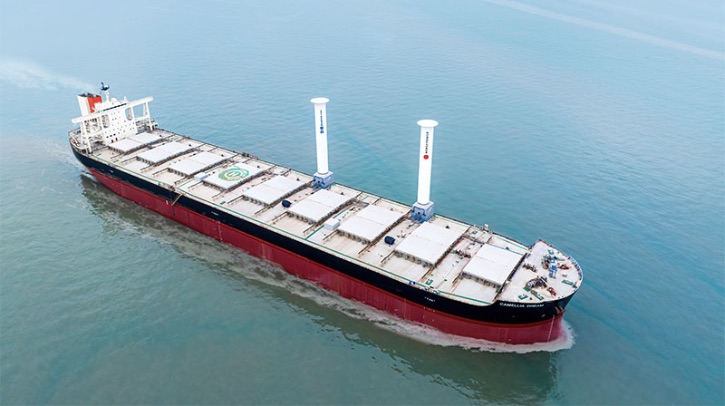Mitsui O.S.K. Lines (MOL) and Vale International have retrofitted a 200,000-ton class bulk carrier with two 35 x 5m Norsepower rotor sails and marked its first call at Ponta da Madeira, Brazil.
According to the partners, this is the world’s first case of rotor sails on a Capesize bulk carrier. The vessel is expected to achieve 6-10% reductions in fuel and GHG emissions on routes between Brazil and the Far East, combined with voyage optimization technology.
The bulk carrier is currently employed under a mid-term contract for the transportation of iron ore for Vale.
MOL and Vale plan to continue to work toward the stable transportation of iron ore and the reduction of GHG emissions, to contribute to the realization of a low-carbon society.
MOL’s sustainability goals
MOL has established the MOL Group Environmental Vision 2.2. and has set the target of achieving net zero GHG emissions by 2050. One of the key actions to achieve this target is the “introduction of clean energy, further energy-saving technologies”, which includes installing wind propulsion systems such as rotor sails and Wind Challengers.
MOL Group says it will contribute not only to the reduction of GHG emissions from its own group but also to the reduction and decarbonization of society as a whole through the safe management and efficient operation of its environmentally friendly fleet that combines wind propulsion technology.
Vale’s decarbonization strategy
Vale has stated that it is committed to supporting the maritime industry in achieving the International Maritime Organization’s (IMO) decarbonization targets. Aligned with the ambition of the Paris Agreement, Vale also has a target of a 15% reduction in Scope 3 emissions by 2035, related to the value chain, of which shipping emissions are part, since the ships are not owned by the company.
Focused on adopting and leveraging technologies and fleet modernization to reduce GHG emissions, Vale created the Ecoshipping program, a R&D initiative based on a strong partnership with shipowners. Since 2018, the company has been operating second-generation Valemaxes (capacity of 400,000 tons) and, since 2019, Guaibamaxes (capacity of 325,000 tons) – these vessels are among the most efficient in the world. As part of the Ecoshipping program, Vale developed energy-efficient projects, such as the rotor sails project and a project to incorporate multi-fuel tanks on iron ore carriers.
In related news, Mitsui OSK Lines (MOL) and Hanwha Ocean recently received approval in principle for the design of a membrane liquefied natural gas (LNG) carrier equipped with MOL’s Wind Challenger wind-assisted ship propulsion system. Click here to read the full story.



